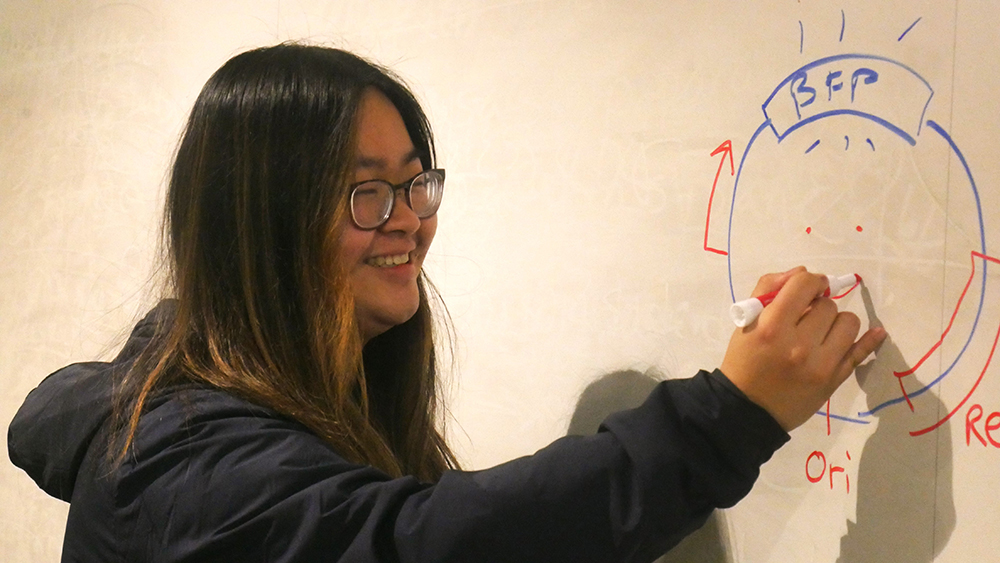Growing as Scientists and as People
By Zongsen Li
Student members of Duke iGEM get research experience and build community, all while fighting a deadly

Every year, cancers of the brain and nervous system take the lives of more than 240,000 people. Gliomas, the most common type of brain cancer, are currently untreatable.
A Duke team is hard at work developing NODES (Novel Organoid-dependent Drug Efficacy Screening), a drug efficacy system capable of screening therapeutic drugs, reducing time and money needed to verify certain drugs and compounds to get them out into clinical trials and into the hands of those who need them the most. The team operates as a local chapter of iGEM, a foundation dedicated to advancing the study of synthetic biology and developing a cooperative community of researchers.
Currently, models for glioma drug screening are lacking. Current model systems for drug screening can be grouped into two categories: in vitro models, which use patient-derived cell lines, and in vivo models, which use animals. Neither system fully addresses the complex features of the brain, however. The Duke iGEM team’s approach uses artificially grown clusters of cells called organoids, which according to the team “have shown promising results in capturing key features of the brain, including cellular morphology and spatial distribution.” If the team’s approach is successful, they could create an accurate representation of the brain during drug testing, allowing researchers and scientists to easily and reliably observe how the brain will respond to certain drugs.
“I really appreciate that I could be part of the scientific journey of everyone involved. I got to collaborate with people in biology, computer science, and biomedical engineering.”
cameron kim
All the work accomplished by the students culminates at the iGEM Grand Jamboree, a competition where more than 350 teams congregate to show off their research. Although the jamboree is competitive in nature, the team members of Duke iGEM appreciate the camaraderie and connections that iGEM has built among students and researchers. “It was really rewarding to present our work to a community that wants synthetic biology to be shared and for our project to be successful,” said Ashley Jones, a senior biology student who works in the lab of biomedical engineering faculty member Brenton Hoffman and serves as iGEM’s president. “It was awesome to see how diverse synthetic biology is. You have people working in all these different spheres, and seeing all these creative minds coming together was a breath of fresh air.”
 Jones said that, although the team focuses much of its energy on the annual competition, it keeps an eye on the longterm future as well. “Duke iGEM is trying to foster a rigorous environment where students get to work on a team, hone their research skills, engage in scientific outreach, and think about the broader impact of their research.”
Jones said that, although the team focuses much of its energy on the annual competition, it keeps an eye on the longterm future as well. “Duke iGEM is trying to foster a rigorous environment where students get to work on a team, hone their research skills, engage in scientific outreach, and think about the broader impact of their research.”
Assistant Professor of the Practice of Biomedical Engineering Cameron Kim, who advises the team, also participated in iGEM as an undergraduate and enjoyed its interdisciplinary nature. “I really appreciate that I could be part of the scientific journey of everyone involved. I got to collaborate with people in biology, computer science, and biomedical engineering,” said Kim.
Although at first glance iGEM appears like any club gearing up for future competition, its heart truly lies in allowing students to grow. “I love to get to know these students at a different level than just as their professor. I get to know their stories, I get to hear what they’ve done with their life, and I get to be a part of their journey,” explained Kim.
iGEM isn’t relegated to Duke alone. In fact, the organization has made huge strides in outreach over the past years, collaborating with local high schools to teach and inspire future engineers and scientists in the field. They have also participated in the Angels Among Us 5k, which raises awareness and funding for brain cancer patients; developed educational outreach materials; and maintained an active social media presence. “Everything we do is meant to be shared with other people,” said Kim. “That’s how we grow as scientists.”
